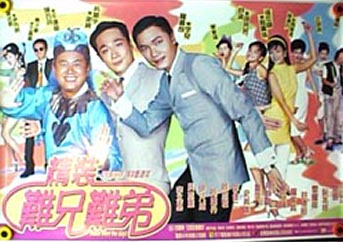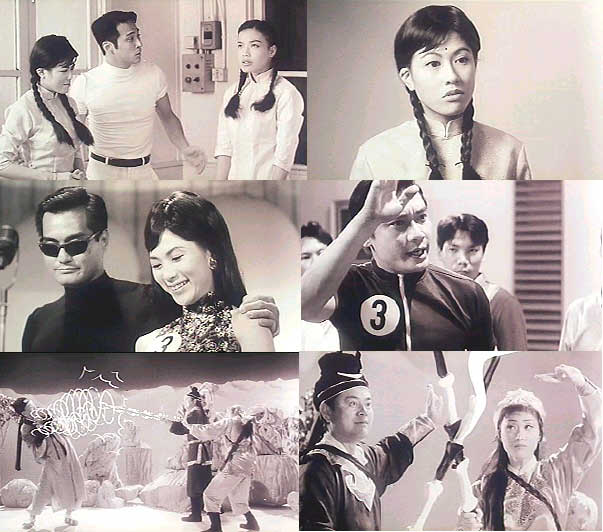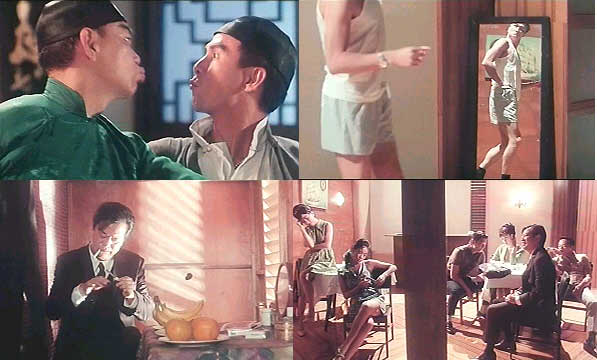Those Were the Days

Director: Dick Cho Kin-nam
Year: 1997
Rating: 3.0/6.0/5.5
I think there are
a number of films with this title, but this one was a pretty feeble comedy
though it had an interesting premise.
A movie award ceremony is taking place in
modern day HK and a director (Dayo Wong) - modeled after I think Wong Kar
Wai (never takes his sunglasses off the entire movie) - makes some comments
about how bad the films were back in the 1960’s & 1970’s. Later that
night as punishment for his snide comments, he is magically transported back
to the movie sets of that time period and told by his transporter that he
has to make a good film before he can return to the present. Well needless
to say he is able to invent some great stuff like wires in kung fu movies!
Still all in all a very dull movie. Hsu Chi has a very small and clothed
role.

My rating for this film: 3.0
Above was the review I wrote a few years back and
it only goes to show how little I knew then about HK film! At the time I watched
this film I was quite new to HK film and just about every reference in the
film went way over my head. I had no idea who the actors were suppose to
be parodying and I had no affection or knowledge of HK Cantonese film of the
1960s. Now - way too many HK films later - I watched the film and enjoyed
it a lot more. I know I am still missing many of the old time references,
but at least now I get some of them and can identify some of the characters
such as Josephine Siao, Connie Chan, Wong Jing, Walter Tso Tat Wah, Lydia
Shum, Patrick Tse Yuen, Kwan Tak Hing, Sek Kin and Nancy Sit.

Many of the movie references - both modern and the older ones also registered
and I found them quite amusing. Its odd that I found myself feeling nostalgic
for a period of film history that I didn't live through - have rarely seen
- and only read about - but I did and I came away from this basically
silly film with a desire to see some of the old films and see the real actors/legends
that were in them. So I would recommend this film primarily for people somewhat
schooled in HK films and with a passing knowledge of the old time stars of
the 60's. Of course, I was still bothered that Hsu Chi had such a small part
- but not so much that she remains clothed - is this a sign of maturity on
my part!
My New Rating for this film: 6.0

Reviewed by YTSL
Considering how fond Hong Kong movie makers can
be of inserting in-jokes and pop culture references into their offerings,
it seemed almost inevitable that a work would get produced that purports
to jokingly comment about the rivalry between Wong Kar Wai and Wong Jing.
Actually, make that at least two films, since this territory was covered
in the Wong Jing helmed “Whatever You Want” -- a comedic effort which had
Anita Yuen playing a video addict who idolized director Wong Jing Wai while
disparaging the movies of a certain portly auteur that was released in 1994
-- as well as in this 1997 Natalis Chan produced adaptation of an award-winning
TVB series (Christopher Fu has described that which was entitled “Old Time
Buddies” in a Mobius Asian Cinema Discussion Board post as one that “parodied
the nostalgic Golden Age of HK films during the 1960s”).

In this particular THOSE WERE THE DAYS (N.B. At last count, there were five
Hong Kong movies that have this title), a post-modern director (Dayo Wong
portrays a character who has a similar hairstyle, physical built and love
of sunglasses as Wong Kar Wai) who looks down on old Cantonese movies gets
sent back to the 1960s (by a supernatural figure who comes in the form of
the respected veteran director, Chor Yuen) and can only return to his own
time if he manages to make a movie that at least one person will like.
Not content with having this individual -- whose name is referred to in this
Cho Kin Nam helmed film’s subtitles as Wong Ching Wai but has been identified
as Wong Jing Wai in such as David Bordwell’s authoritative “Planet Hong Kong”
-- be an anti-Cantonese cinematic snob in public (with a propensity to scatter
his critical pronouncements with foreign words and phrases), this work’s producers
also depict him as being disrespectful of his elders as well as more populist
contemporaries (e.g., someone named in the subtitles as Wong Shing) and not
above getting his girlfriend to purchase pirated VCDs -- some of them Category
IVers (i.e., porn movies) -- for him to view in the privacy of his home.

Upon being transported back to the premises of a Wah Tat Studio in the year
1967 that supposedly resembles the Shaw Brothers Studio of that time period),
Wong Ching Wai encounters -- and cross the paths of -- many of the stars,
future luminaries and assorted other personalities of what can seem like a
parallel 1960s Cantonese movie universe. Even someone as unknowledgeable
about that era of Hong Kong movies as myself could recognize among them those
individuals who were made out to be Kwan Tak Hing (who Law Kar Ying plays
as a crabby old man who acts like he really is Wong Fei Hung), Shek Kin (best
known in the 1960s as the man who portrayed Wong Fei Hung’s seemingly perennial
arch-rival), Josephine Siao Fong Fong (played here by -- of all people! --Hsu
Chi), Connie Chan Po Chu (who comes in the form of Maggie Cheung Ho Yee),
Nancy Sit (who is essayed by Joyce Chan) and Lydia Shum (played by the often
male cross-dressed Lee Kin-yan). Additionally, there is the chubby father-son
pair -- named here as Wong Tin Lam (Vincent Kuk conforms to my vision of
what a younger Wong Ting Lam looked like!) and Wong Shing (who was
but a bespectacled innocent plus idealist at this point of his life) -- who
are well known to more than one generation of Hong Kong moviephiles.

Through a series of accidental and fortuitous events, Wong Ching Wai makes
the acquaintance of three then still not yet famous actors (Francis Ng plays
someone who is modeled on Patrick Tse, Natalis Chan’s character bears some
resemblance to Walter Cho, and Gallen Lo portrays a future “King of Porn”
named Li Kei). After he -- who bye the bye is revealed to not necessarily
be that bad a fellow -- helps the affable trio of friends (by way of future
inventions as wire-enhanced kung fu moves as well as having knowledge of precisely
which movies they would achieve popularity by being in), they -- and their
girlfriends -- help him to get put at the helm of at least three films.
Seemingly unable to help himself, Wong Ching Wai: Makes a Wong Fei
Hung movie that has the martial arts doyen having a love-hate relationship
with his old rival that bears more than a passing resemblance to that of
“Happy Together”; produces another work whose visuals recall that of “Ashes
of Time”; and looks to recreate “Days of Being Wild” (with Francis Ng and
Gallen Lo’s characters taking turns being Yuddy and Natalis Chan’s character
in the Tony Leung Chiu Wai role). As one might expect, these are not
box office hits.

On a personal note: Probably in part because I could easily identify
them, I found these comic movie references -- plus those to other (more) contemporary
productions like “Police Story”, “He’s a Woman, She’s a Man” and “Young and
Dangerous I” -- to be among the funniest bits of THOSE WERE THE DAYS.
As with the 1994 Anita Yuen vehicle, I could have done with a lot more of
them. As it stands though, I felt that my viewing pleasure was hampered
by my lack of familiarity with many of the older personalities and works
that were being alluded to and poked fun at. Things were also not helped
at all by: Such as newspaper headlines and in-film IDs of characters
not getting translated (for the benefit of non-readers of Chinese); and this
often casual feeling effort's subtitles being very hex-error filled (Two
e.g.s of what I mean are: “He...very mandom”; and “I have staggers”
(i.e., daggers)). Consequently, even though my sense is that the hearts
of this anonymously scripted offering’s producers were actually in the right
place, what got turned out was something that wasn’t half as inspired as
its premise was intriguing.
My rating for the film: 5.5
If anyone at any time wants to help in filling
out this grid - please send me an e-mail. Thanks to John Charles's book Hong
Kong Filmography 1977-1997, Ranberator and James Chang for helping me fill
in some of these blanks.
| Actor |
Film Character's Name |
Character Portrayed |
| Francis Ng |
Tse Yuen |
Patrick Tse Yuen |
| Gallen Lo/Law |
Li Kei |
Lui Kei - "King of Porn" - producer |
| Natalis Chan |
Ngau Tat Wah |
Walter Tso Tat Wah |
| Hsu Chi |
Siu Fong Fong |
Josephine Siao Fong Fong |
| Maggie Cheung Ho Yee |
Ching Po Chu |
Connie Chan Po Chu |
| Lee Kin Yee |
Fat Fat |
Lydia Shum |
| Dayo Wong |
Wong Ching Wai |
Wong Kar-wai |
| ?? |
Wong Shing |
Wong Jing |
| Vincent Kok |
Wong Tin Lam |
Wong Ting Lam (Wong Jing's father) |
| Peter Ngor |
?? |
Shek Kin |
| Lee Siu-kei |
The Director |
?? |
| Ha Ping |
Siu Fong Fong's mother |
Josephine Siao's mother |
| Yuen King Tan |
Ching Po Chu's mother |
Connie Chan's mother |
| Joyce Chan |
Ka Yin |
Nancy Sit Ka Yin |
| Monica Chan |
Sister Chau Yee |
Yu Su Chiu - daughter of mentor of 7 Fortunes |
| Ricky Yee Fan-wai |
Kwan Mak Kei (the bad guy) |
Mak Kei - often villain in films |
| ?? |
The Boss |
Run Run Shaw?? |
| Cheung Tat Ming |
Brother Cheung |
Sun Ma Chai |
| Chor Yuen |
Chor Wood Yan |
Cheung Wood Yau |
| Wayne Lai |
The Delivery Boy |
Roman Tam (Law Man) - singer |
| Lawrence Cheng |
Tall Chuen - Actor in scene near end and
in Buddhist Palm |
Ko Lo Chuen - comedic actor |
| Alvina Kong |
Brother Cheung's wife - Cheung Siu |
Sun Ma Chai's wife |
| Teresa Mak |
Dik Loh - actress in bath |
Tina Leung/Di Na - risque actress back then |
Thanks to Ranberator for the following information!
Mak Kei is an actor, often portraying bad guys.
Ko Lo Chuen is a veteran comedic actor known
and named for his height. Ko Lo = tall man literally.
Sun Ma Chai (Sun Ma Sze Tsang), aka Tang Wing-cheung,
is a popular Chinese opera singer/actor who remained
in the public eye after the popularity of Cantonese
opera waned, by hosting and often performing in
charity Chinese opera fund raisers (similar to
Jerry Lewis in this respect), earning him the nickname
Charity Opera King. His wife, a former
night club hostess 30 years his junior, was to enage in an ugly
fight with his children over his inheritance while
he was dying of illness.
The "delivery boy" who ended up in bed with Lydia
Sum Din Ha is the retired Cantopop singer Roman Tam, aka
Law Man. He is rumored to be gay. In
the early 1970's he was a young unknown upstart who dated Lydia
Sum (who was by then one of the regular hosts of
the popular TV variety show Enjoy Yourself Tonight). The
two often performed on the show as "The Lover's
Duo" (approx. translation). They soon broke up after he
had achieved fame. Law Man is reportedly battling
liver cancer.
Lastly, the boss in the movie does look like
one of the Shaw Brothers. Very good casting and make up job!










